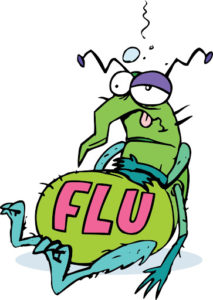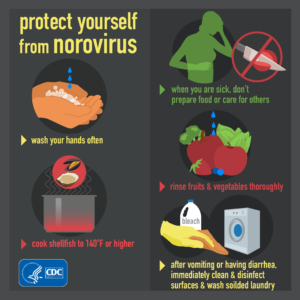 Happy February! Did you know that February is generally the month where influenza hits its peak? With the news all a buzz about the latest Coronavirus outbreak, (by the way there are no cases in Colorado at this time) we thought maybe some useful tips about avoiding and recovering from the flu, and less notorious viruses that hit this time of year, might be helpful.
Happy February! Did you know that February is generally the month where influenza hits its peak? With the news all a buzz about the latest Coronavirus outbreak, (by the way there are no cases in Colorado at this time) we thought maybe some useful tips about avoiding and recovering from the flu, and less notorious viruses that hit this time of year, might be helpful.
 Influenza, What is it?
Influenza, What is it?
The flu is a respiratory illness caused by the influenza virus. The flu is highly contagious, especially between the day before feeling symptoms and up to five days after being sick. It typically lasts four – five days and includes the following symptoms:
- Muscle or body aches
- A cough
- Runny or stuffy nose
- Itchy or watery eyes
- A sore throat
- Fatigue
- Low fever
These are the same types of symptoms you might get if you have a cold, the difference being that a cold comes on gradually and with less severity than the flu which can hit all at once and make you feel like you’ve been run over by a truck. The best treatment advice: stay home and avoid contact with other people. Drink plenty of fluids (especially at this altitude), sleep, take it easy and give yourself time to heal. You might even try some Elderberry syrup to reduce the symptoms and duration. To find out more about symptoms, the different strains of influenza and when you may want to see a doctor, check out the website verywellhealth or the CDC they have some great information.
St omach “Flu” AKA Norovirus
omach “Flu” AKA Norovirus
Norovirus is commonly referred to as the stomach flu, though it is not caused by an influenza virus. It probably is referred to this way because, like the flu, you feel pretty horrendous. You can also have several flu symptoms which include fever, headache and body aches, but these are accompanied by:
- diarrhea
- vomiting
- nausea
- stomach pain
Norovirus is also highly contagious and easily spread through contact with contaminated food, water, people, or surfaces. You can even spread it for at least two weeks after your symptoms have gone and you feel better. According to the CDC, you shed billions (yes billions!) of norovirus particles that you can’t even see without a microscope and it only takes a few particles to make people sick. You can read more about it on the CDC website.
Avoiding the spread of disease
Since we live in a resort community, the likelihood of coming into contact with people, from around the country and world, that are carrying an influenza strain, norovirus, or a myriad of other viruses, is quite high. Good hygiene, a healthy diet and getting enough sleep are key components of staying healthy. So is avoiding close contact with people who are sick and if you’re the one feeling ill, stay home. The less exposure you have with the outside world the better for you and everyone you may infect!
Stay hydrated, according to WebMd, “to stay hydrated, drink at least 64 ounces of liquid each day – it doesn’t all have to be water. Fluids help to thin out the thick mucus that builds up with the flu. Hot drinks may work better than cold. Avoid coffee, tea with caffeine, or alcohol. They can all dry you out.”
Consider adding in some vitamins and minerals that may help boost your immunity. Get good sleep and deal with your stress. Be conscious of hand washing and hand sanitizing after touching people, blowing your nose, coughing or touching surfaces (like the grocery cart), before touching your face or eating. 
What are ways you and your family stay healthy during flu and tourist season? Let us know and be safe out there!

